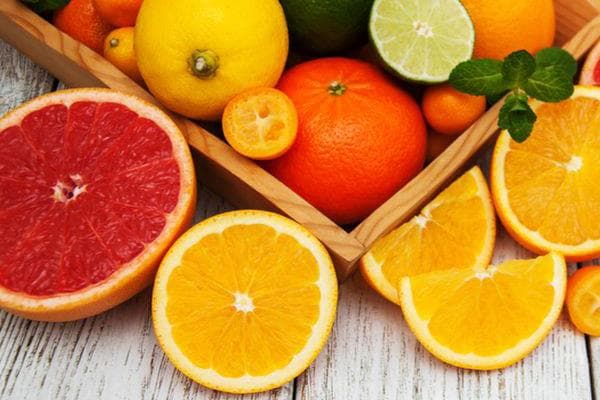Citrus Bioflavonoids for Better Health
The first thing that comes to mind when you think of citrus nutrition is probably vitamin C, but citrus fruits are brimming with other nutrients too, including many vitamins and minerals that you’ve heard of, like potassium, folic acid, thiamin (vitamin B1), and vitamin A, plus others that aren’t so commonly mentioned.1 Citrus bioflavonoids are among those lesser-known nutrients in citrus fruits, and they are definitely worth knowing about for their health-promoting benefits.
Bioflavonoids were first discovered in 1936 by Nobel-prize winning scientist and vitamin C research pioneer Albert Szent-Gyorgi, who originally named the group of compounds "vitamin P." 2 Since then, thousands of flavonoids have been identified and classified according to chemical structure.
Like vitamin C, citrus bioflavonoids have strong antioxidant properties. There are many different types of bioflavonoids from various sources, each one having unique benefits to offer.
What Exactly are Bioflavonoids?
Bioflavonoid is a term used to describe biologically active members of a group of plant-derived polyphenolic compounds known as flavonoids.3 Scientists are aware of between 4,000 and 8,000 of them, found in fruits, vegetables and other foods like dark chocolate and wine.3,4 Some of them are even used in pharmaceuticals.3
Researchers are primarily interested in bioflavonoids because of their antioxidant power. And if you think you’ve heard that before, you’re right! Antioxidants are a key focus of numerous studies because they help protect your cells from free radical damage, and you need a lot of different types of antioxidants in your diet because each one works differently.3,5 Certain kinds of antioxidants have an affinity for particular areas of the body (like lutein, astaxanthin and zeaxanthin for eye health) and others offer broader-reaching benefits.
Antioxidants like citrus bioflavonoids are so important because they help protect your cells from free radicals and oxidation.5 The trillions of cells in your body face threats every day that can contribute to oxidative damage—from environmental exposures to toxins and UV rays, lifestyle factors like diet, exercise and habits, and even from your body’s typical day to day functions, which generate free radicals as a byproduct of natural processes like digestion and respiration.5
Antioxidants can help stop free radicals before they develop, or even break them down.5 And since various antioxidants help specific areas of the body, it’s best to get a variety of them in your diet. That’s one of the many reasons you’ve always heard you should eat a diverse range of whole foods. Natural foods offer unique nutrients that help your body and its cells in different ways, and citrus bioflavonoids are among those nutrients that promote wellbeing.
Benefits of Citrus Bioflavonoids
Most of the health benefits attributed to bioflavonoids relate to their antioxidant activity, which has been demonstrated in numerous studies.4 Citrus bioflavonoids are derived from fruits high in vitamin C, and they appear to act synergistically with the vitamin to neutralize free radicals. The antioxidant properties of citrus bioflavonoids are thought to be particularly beneficial for capillary strength, possibly by helping protect collagen, and they may also promote healthy circulation, as well as immune, cognitive and joint health.7,8
Citrus Bioflavonoid Benefits
- Antioxidant protection
Citrus bioflavonoids are potent antioxidants that help combat free radicals and work synergistically with vitamin C.3,6 - Capillary strength
Studies have shown that certain citrus bioflavonoids may strengthen capillaries, and researchers believe that may be related to its ability to protect collagen.6 - Circulatory health
Citrus bioflavonoids may also provide benefits to overall circulatory health.6 - Immune support
Numerous studies have demonstrated the ability of citrus bioflavonoids to help support a healthy immune system and immune response.6,7
Bioflavonoid Supplements
Many citrus bioflavonoids are conveniently available in either individual citrus bioflavonoid supplements, citrus bioflavonoid complex supplements, or in combination formulas with vitamin C. Compounds commonly featured in citrus bioflavonoid supplements include hesperidin, rutin, naringin, and quercetin. Here are some citrus bioflavonoid supplements available from Swanson Health.
Swanson Premium Rutin
Fight free radicals with Swanson Premium Rutin! This powerful antioxidant bioflavonoid works synergistically with vitamin C to protect your cells from free-radicals. Each serving delivers 250 mg of rutin.
Swanson Ultra Vitamin C with Bioflavonoids
Swanson PureWay-C 500 mg with Bioflavonoids is different from all previous forms of vitamin C because it employs lipid metabolites, from vegetable waxes, to enhance the uptake, distribution and release kinetics of ascorbic acid. PureWay-C uses lipid metabolism to alter the lipid absorption potential of generally water-soluble ascorbic acid, thereby enhancing the vitamin's bioavailability unlike any other formulation.
Swanson Premium Hesperidin
Give your cardiovascular system a nutritional tune-up with the free-radical fighting power of Swanson Hesperidin. An antioxidant flavonoid found in citrus fruits like lemons, oranges and tangelos, hesperidin helps protect against free radicals and helps support cardiovascular wellness.
Swanson Superior Herbs Naringin
Swanson Naringin is a beneficial glycoside flavonoid concentrated from grapefruit peel. Naringin gives grapefruit its characteristic bitter flavor and works synergistically with vitamin C to pump up cellular defenses. Each of our capsules offers more naringin than you would drink in one 16 oz glass of fresh grapefruit juice—and with no bitter flavor!
Swanson Premium Full Spectrum Citrus Bioflavonoid Complex
There's more to citrus than just vitamin C! Citrus fruits contain natural compounds known as bioflavonoids, which aid the absorption of vitamin C and complement its antioxidant potency. Our special formula features citrus bioflavonoids from bitter orange. It's the perfect companion for your daily vitamin C supplement, or great all by itself!
Bioflavonoid Dosage
Always follow the bioflavonoid dosage directions on your product label unless your doctor has specified otherwise. Although the optimum daily citrus bioflavonoid intake has not been determined, some supplement advocates recommend 2,000 to 6,000 mg of citrus bioflavonoids for adults each day.8
Bioflavonoids appear to have very low toxicity, and side effects are typically rare.8 Research indicates that some flavonoids found in grapefruit juice may interfere with an enzyme that breaks down certain drugs, increasing the drugs' activity. 8 For this reason, people taking prescription medications should consult a doctor or pharmacist before taking bioflavonoid supplements.
Do You Need Citrus Bioflavonoid Supplements?
Bioflavonoids are a healthy component of a natural food diet rich in a wide variety of fruits and vegetables. If you’re like many Americans though, you probably don’t eat enough fruits and veggies every day. According to the Centers for Disease Control and Prevention (CDC), just 1 in 10 adults meet the federal recommendations for fruit and vegetable consumption.9
Nutritional supplements can help meet your body’s demand for nutrients that you aren’t getting regularly from food choices, and citrus bioflavonoids are no exception. Citrus bioflavonoid supplements are a convenient way to help your body get the antioxidants it needs to stay healthy.
You be well, now.
Swanson

About Lindsey Toth, MS, RD
Lindsey is a nationally-recognized registered dietitian and nutritionist with a soft spot for pie. She empowers people to take charge of their health by finding the balance between the pleasure and nourishment in food. Her philosophy is that you should take care of your body because it’s the only permanent home you have. It’s what inspired her to pursue a career in nutrition.
*These statements have not been evaluated by the Food and Drug Administration. These products are not intended to diagnose, treat, cure, or prevent any disease.
Sources
1. Nutritional and Health Benefits of Citrus Fruits. FAO. Read source
2. Herbs and Natural Supplements, Volume 2. By Lesley Braun, Marc Cohen. Read source
3. What You Should Know About Bioflavonoids. Healthline. Read source
4. Flavonoid. Science Direct. Read source
5. High Anti-oxidant Foods to Try. WebMD. Read source
6. Bioflavonoids. Everyday Health. Read source
7. Citrus Bioflavonoids: Synergy with Vitamin C & Beyond. Nutraceuticals World. Read source
8. Bioflavonoids. NDhealthFACTS Wiki. Read source
9. Only 1 in 10 Adults Get Enough Fruits or Vegetables. Centers for Disease Control and Prevention. Read source




